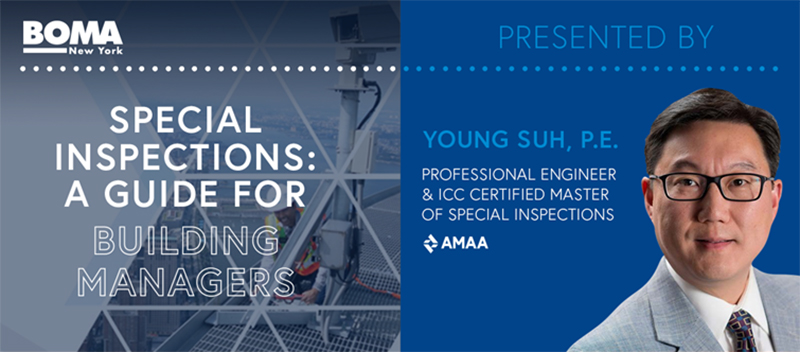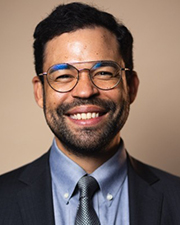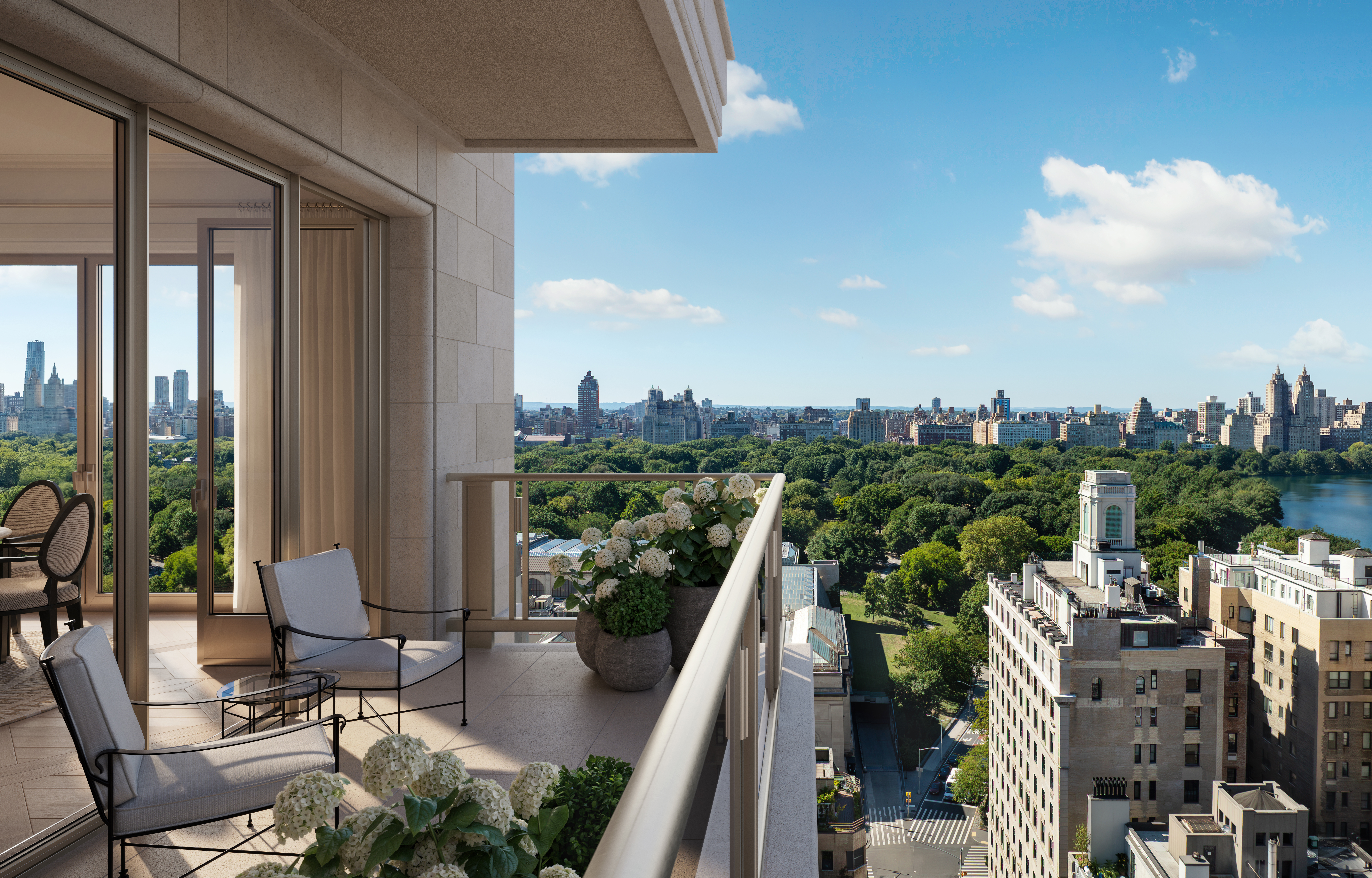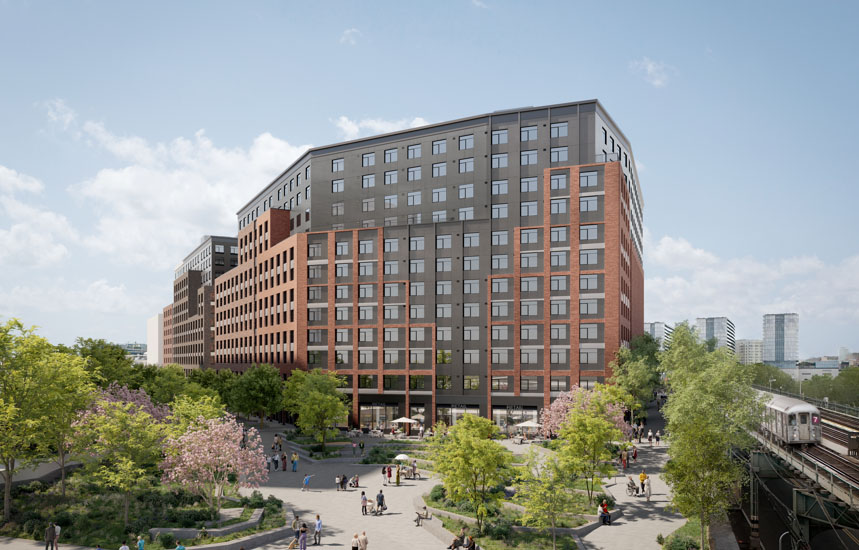BOMA NY Monthly Forum: Special Inspections: A Guide for Building Managers

New York, NY BOMA New York’s November 2021 Monthly Forum, entitled “Special Inspections: A Guide for Building Managers,” offered a professional engineer’s experienced insight into the rigorous building inspection code requirements of the International Building Code, as amended and updated by the New York City Department of Buildings, most recently in 2014. Special inspections are required by the construction permit process.
Presented by Young Suh, P.E., director of special inspections at Alan Margolin & Associated (AMAA), this forum introduced attendees to the history and process of modern special inspections for commercial buildings. Suh explained the differences between Class One and Class Two special inspections and offered tips for building managers to identify their buildings’ special inspection requirements and scheduling timelines.
Based in New York City, Suh’s firm has a 40-year history, having performed special inspections for more than 8,000 major projects worldwide, including One World Trade Center.
To begin, Suh said that the key differentiation between the international code and the New York City code is that special inspectors in New York City must be individually registered with the Department of Buildings. A Class One accredited special inspection agency is qualified to perform inspections – there are at least 50 different types of inspections – on any building project in the city. A Class Two agency is not allowed to perform special inspections for major renovation projects and new major construction or demolition projects.
The main takeaway is that, according to Suh, special inspections are required for almost all construction work that requires a work permit. “More often than not,” he said, “you will need one.”
In New York City, Suh explained, it is the responsibility of the Applicant of Record, also known as the Design Applicant, to determine the list of special inspections required for a project. Occasionally, Suh said, the inspection scope is decided by a conference among the Applicant of Record, the Department of Buildings, and the selected special inspection agency. An expediter is often retained in the process, as well.
Suh offered a pro-tip: These lists are often generated from similar prior project templates. He said, “Watch out for ‘copy-and-paste’ errors.”
Special inspections are generally categorized as architectural, civil, structural and mechanical.
Architectural inspections are to confirm that fire safety construction elements and systems, as well as the building envelope are in conformance with the Department of Buildings’ approved architectural drawings. The special inspector confirms that all fire-rated partitions, floors, ceilings, and shafts comply with design and code requirements, as well as that all penetration and construction joints have been properly sealed with approved materials. The special inspector will help assure that all work is built to code and complies with all local laws, paths of egress are provided in accordance with design and code requirements, and construction complies with ADA requirements indicated on drawings.
Civil inspections begin at the excavation stage of a project. The special inspector will be on-site to confirm all construction activity is performed in compliance with approved project plans. Civil inspection services will take a project from subsurface to ground level, including, but not limited to, structural pile installations for retaining walls, footings and foundations, sheeting, shoring and bracing for excavations, underpinning of existing adjacent structures, and soil fill, placement and testing.
Structural inspections make sure that elements used during construction are sound and safe. Special inspectors account for location and size of members, as well as reinforcing steel grade, spacing, supports, and coatings, adhere to approved drawings. These inspections also involve non-destructive testing services such as ultrasonic testing to determine the integrity of multiple layers of welding, invisible to the eye.
Mechanical inspections confirm proper installation and functionality of mechanical equipment for a project. Special inspectors confirm that piping and ductwork layouts conform to approved project drawings; and that all supports, hangers, bracing, and vibration isolation are properly spaced and anchored.
Suh also offered a review of the types of equipment used in performing special inspections.
What information will the Department of Buildings require? Suh explained that the main items are copies of drawings, the list of specific special inspection items and information about the builder/developer’s designated contractor. He reiterated that special inspections must be conducted by a DOB-registered special inspection agency.
Because special inspections are directly related to the permitting process, inspections should take place throughout the project construction timeline. Suh said, “The special inspection agency will follow up with the contractor to determine if work has been done and if it’s now time for another inspection.”
In answer to that important question of when to expect a sign-off, Suh said that sign-offs are always determined on a case-by-case basis. “Usually this is at the completion of work,” he said. However, it is not uncommon to have partial signoffs when “chicken and egg” situations arise regarding one aspect of a project depending on the completion of a different aspect that, apparently, depends on the completion of the first aspect! In this case, a sign-off will be granted for the extent of the work completed to date.
Another frequently asked question is, “What causes project delays prior to signoff?” The answer, according to Suh, “Lots of things!” A common cause is the need for strict adherence to fire safety codes, from drawings to mechanical equipment scheduling and smoke damper testing.
In conclusion, Suh discussed his best practices for building owners. Most importantly, owners should retain special inspection agencies directly, and not through contractors. Contractors are not allowed to hire special inspectors due to conflict-of-interest concerns. Suh said that lump sum pricing arrangements are best for all parties, and that special inspectors should be on hand right from the kickoff meeting of any project. Also, that owners should require copies of all inspection reports.
Habitat, Duvernay + Brooks and Buffalo Municipal Housing close on 254-unit first phase redev. of Marine Drive Apts.


The CRE content gap: Why owners and brokers need better digital narratives in 2026 - by Kimberly Zar Bloorian








.gif)


.jpg)
.gif)